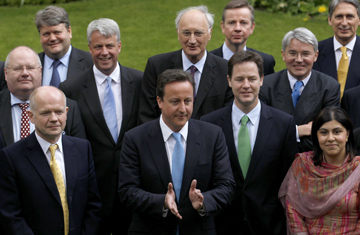
Britain's Prime Minister David Cameron (front row, second from left) with his new Cabinet ministers
Only days after the formation of the U.K.'s new coalition government, Foreign Secretary William Hague's first overseas visit was to meet with U.S. Secretary of State Hillary Clinton in Washington, D.C. The main topics of discussion last Friday were Afghanistan and Iran, issues on which, earlier this month, Prime Minister David Cameron's Conservatives and Deputy PM Nick Clegg's Liberal Democrats substantially disagreed. With voters forcing the Tories and the Lib Dems to work together, the order of the day is compromise, and both sides have been forced to abandon or trim some of the policies they have held so dear for so long.
Exactly how all this will play out over the coming weeks and months is impossible to predict — Britain is in uncharted territory. But of the key polices already settled, here is where the new U.K. government stands:
Relationship with the U.S.
It will be a struggle for Conservative Cameron to form as close, and as unlikely, a relationship with Democratic President Barack Obama as Labour's Tony Blair did with Republican George W. Bush. But it was a clear sign that the Britain's much-loved "special relationship" with the U.S. will continue when Obama became the first international leader to phone Cameron after his ascension to Downing Street on May 11.
The relationship between Secretary of State Clinton and her British counterpart Hague may not be quite so special. It's hard to see Clinton developing quite the same warm, almost gooey, bond with Hague — a blunt Yorkshireman who once claimed he drank 14 pints of beer a day when working as a drinks delivery man — as she did with his predecessor, the smooth, Oxford- and MIT-educated David Miliband.
The key policy issues in play during Hague's visit are Afghanistan and Iran and, despite severe differences between the two halves of the coalition government over these issues, there are unlikely to be any big changes in approach. On Afghanistan, that involves continuing the ongoing operations with a view to leaving only when the country can police itself. And on Iran, it means insisting Tehran must fall in line with the international community over its nuclear program. The biggest potential source of tension on Iran is the Lib Dems' previous policy of opposing any military action against the country.
Place in Europe
Conservative relations with the European Union have always been a source of strife within the party, whose hard-line Euroskeptics want maximum repatriation of powers or even outright withdrawal. Cameron tried to heal the rifts by pulling his party in Brussels out of the center-right European People's Party — which includes leaders like Germany's Chancellor Angela Merkel and French President Nicolas Sarkozy — and creating a new grouping of right-wing leaders, among them Michal Kaminski of Poland's Law and Justice Party, which has banned gay marches, and the Czech Republic's ODS, whose founder Vaclav Klaus has denounced climate change as a myth. Cameron has been attacked for weakening the Conservatives' influence in the E.U. as a result, while Clegg declared during the election campaign that his future coalition partner had allied himself in Europe with a "bunch of nutters ... and homophobes."
Now that Cameron is in power, however, other E.U. leaders will have little choice but to deal with him. His previous decision to rule out ever joining the euro has been watered down to "not in the lifetime of a Parliament" — which will mean the next five years if the government pushes through its plan to introduce a fixed term — as a compromise with his new coalition partners, who have long advocated joining "when the time is right." But the economic crisis currently buffeting the euro zone has made this pretty much a nonissue. No further powers will be ceded to the E.U., in any event, without a referendum.
